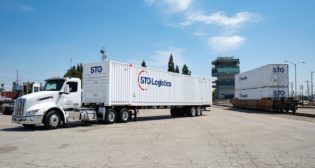
House Dems grill somnolent STB
Written by Frank N. Wilner, Capitol Hill Contributing Editor
“Some of the vultures of Wall Street have decided to come into the rail industry, and … make a quick buck without any … concern [for] what happens to the people who have to rely on [railroads].”—Rep. Michael Capuano (D-Mass.)
Were there any doubt that the Surface Transportation Board (STB) has been on siesta since the departure of former Chairman Dan Elliott in September, a House Rail Subcommittee oversight hearing April 17 confirmed the languor.
The subcommittee was told by its current two members—Chairman Ann Begeman, a Republican, and Deb Miller, a Democrat—that four long-pending policy determinations by the Board, which could fundamentally alter regulatory remedies available to captive shippers, remain pending. These include a review of methodology to determine railroad revenue adequacy (dating to 2014), and a petition to determine whether existing rules governing competitive access should be modified (filed in 2011).
Additionally, a congressional directive, issued through the Surface Transportation Board Reauthorization Act of 2015, to reform a frightfully expensive and exceedingly complex method of determining maximum allowable freight rates is stalled in study. The Board not only is unable to predict completion, but Begeman said it is “almost impossible” now to meet the directive’s order to streamline the process.
While captive shipper rate reasonableness complaints have long been the foundational workload of the STB, the cases have ceased to be filed owing to shipper frustration with STB ennui over streamlining the process. Begeman told the subcommittee that no new rate cases have been filed with the STB since 2015.
While not participating as a witness, a shipper representative told Railway Age afterward that “were some methodology available other than the long-criticized Stand-Alone Cost (SAC) test that Congress told the Board to fix back in 2015, many shippers would invoke it.”
The status quo may be hunky-dory for railroads in the short term. But swelling shipper frustration could feed unwelcome legislative change. So forceful was a mid-1980s captive shipper assault on partial economic deregulation passed by Congress in 1980, that railroads made haste to head off feared reregulation by initiating with shipper groups a consensus compromise on some of the same competitive access issues that have again surfaced—only to fester before the STB.
The repetitive polite response of Begeman to the “what, why and when” of lawmaker inquiries at the April 17 oversight hearing was that the STB is awaiting the arrival of reinforcements to fill three empty seats on the five-person STB. Two Republican nominees await Senate confirmation; a Democrat has yet to be nominated. Yet there is no statutory quorum requirement for the STB, and it has functioned productively in the past with just one member.
In fact, as STB professional staff performs the primary economics, environmental, legal and other primary research that precedes decision-making, the failure to produce decisions until the Board reaches maximum five-member strength is one of choice—a choice made jointly by Begeman and Miller following Elliott’s departure seven months ago. Neither Begeman nor Miller indicated the STB is short on professional staff.
The sparsely attended subcommittee hearing could have masqueraded as a high school study-hall of snoozers had it not been for a seemingly over-caffeinated Rep. Michael E. Capuano of Massachusetts, who is the subcommittee’s senior Democrat. While Subcommittee Chairman Jeff Denham (R-Calif.) read from an innocuous statement, Capuano provided a preview of life for railroads should Democrats regain House control in mid-term elections and he becomes subcommittee chairman.
Doing an impressive impersonation of a Bernie Madoff victim, an emotionally detonated Capuano launched into a verbal mugging of hedge funds generally, and CSX specifically, causing the usually unflappable Begeman to pause and struggle for words.
CAPUANO: Some of the vultures of Wall Street have decided to come into the rail industry, and … make a quick buck without any … concern [for] what happens to the people who have to rely on [railroads]. The service isn’t deteriorating on the good lines. It is deteriorating on the few lines that seem to have been taken over by Wall Street. Does the STB have the tools to deal with these kinds of investors to ensure that America has, and continues to have, a reasonably priced and effective freight rail system?
BEGEMAN: I believe the Board has largely untethered authority should it need to go that route. [Railroads] have an obligation to serve customers, and that is what we will make sure [they] do, and if [they] don’t, we’ll find another carrier who will be happy to do it.
In fact, the Board’s authority is tethered—to what Congress authorizes in the statute.
The statute does contain a “directed service” provision allowing the STB to authorize another railroad to operate over the tracks of the incumbent railroad. Such authority is for a maximum of 270 days, beginning with a 30-day order. The STB may set trackage rights compensation.
Directed service orders are exceptionally rare, and it is problematic that other Class I railroads would care to “invade” CSX territory when they face their own service challenges. The statute prohibits the Board from ordering directed service if it would “impair substantially the ability of a rail carrier to service its own customers adequately, or to meet its own common carrier obligations.” A suggested directed service order was rejected by the STB during a massive service meltdown following the 1996 acquisition by Union Pacific of Southern Pacific,
The Board also retains authority, granted by Congress in 1917 to alleviate World War I rail congestion at ports, to direct the movement, distribution and return of freight cars.
Capuano, however, seemed to suggest punishing CSX in the pocketbook through government fiat for the sins he ascribed to CSX investors. While the STB cannot directly reduce shareholder dividends or halt stock buybacks that are authorized by the CSX board, it can impose modest monetary fines (less than $8,000 daily) against a railroad for non-compliance with its orders, and it can limit future rate increases (as was done sparingly and benefiting only a few coal shippers following the Berkshire Hathaway acquisition of BNSF).
Joining Capuano in providing a negative assessment of CSX service was Rep. Peter DeFazio of Oregon (pictured, below), the senior Democrat on the subcommittee’s parent Transportation & Infrastructure Committee, who is likely to chair the parent committee should Democrats regain House control in the November mid-term elections.

“We all know that CSX, because of the radical management change … was degraded dramatically by a particular individual who took over before he died,” DeFazio said, referring to the late E. Hunter Harrison. “But I was surprised to see you are finding nationwide a deterioration in service.”
As to complaints of rail service degradation generally, Begeman and Miller said action so far has been data gathering, letter writing and jawboning. Begeman said the service problems have not had as “severe” an impact as did rail service failures in 2013 and 2014, and that she sees improvement.
Of note, Patrick J. Fuchs, one of the two Republican nominees seeking Senate confirmation to the STB, attended the hearing. The second Republican nominee, Michelle A. Schultz, was not present.
Note, also, that a CSX investor has filed a lawsuit in federal court in Florida against 15 CSX board members alleging misconduct and misleading of shareholders in hiring Harrison, who died nine months after his March 2017 arrival. The suit alleges the CSX board members ignored concerns over Harrison’s health in agreeing to an “outrageous” $300 million compensation package. The lawsuit seeks to recover damages from the board members.
A CSX spokesperson told Railway Age several months ago that the railroad is seeking “to claw back” from Harrison’s estate some of that $300 million in compensation. In the year since Harrison was hired, CSX stock has been on a roller coaster ride, but has risen from under $50 to a high of more than $60. The railroad also has sidelined some 1,000 locomotives, reduced employee headcount by some 4,000, parked some 20,000 rail cars, and initiated line sales.



